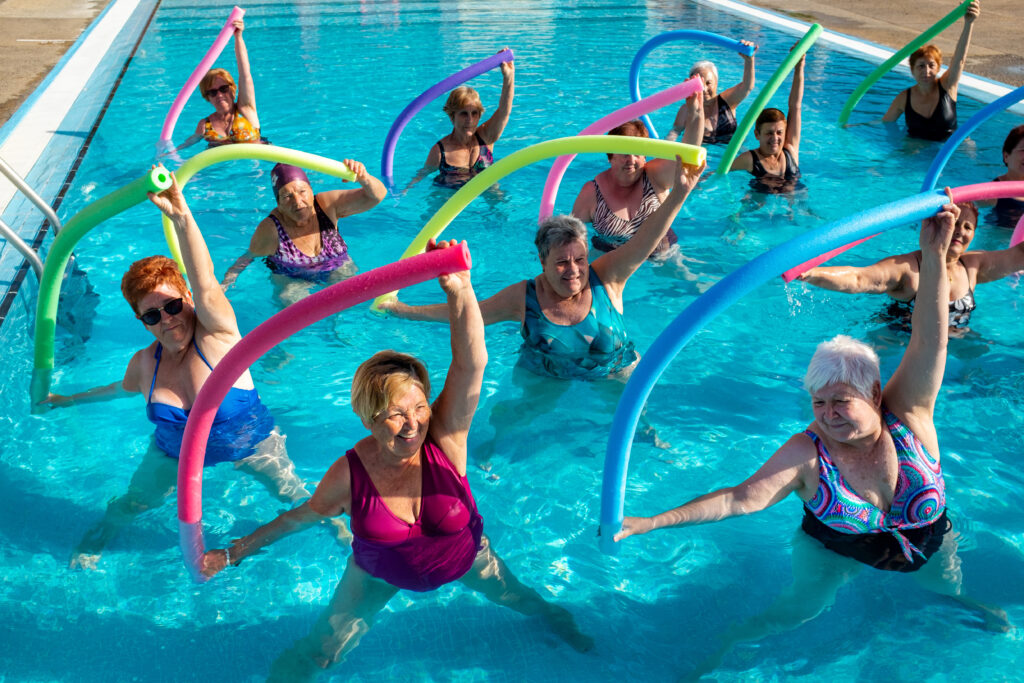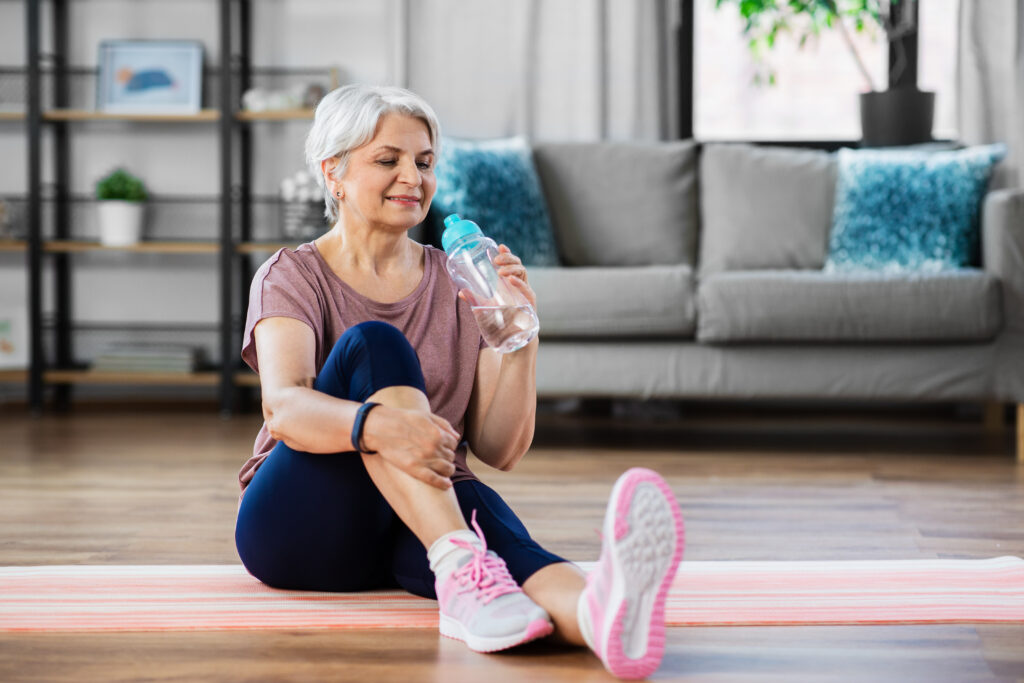As we get older, our bodies go through numerous changes, and it’s essential to recognize that they have different needs. Adopting a healthy lifestyle can help us maintain our independence and wellbeing as we get older. September is Healthy Aging Month, and what better way to celebrate it than by providing informative tips and guidance on how to stay healthy and active throughout life’s journey.
As we go through life, our bodies undergo changes that can make it challenging to maintain the same level of physical activity and dietary habits that we had in our younger years. However, this doesn’t mean that we should stop looking after ourselves or that we’re limited in what we can do. With a few adjustments, we can remain healthy, active, and independent well into our golden years.
In this blog post, we will talk about the importance of exercise and diet as we age. We know that adjusting your habits can be intimidating but know that small choices can have a significant impact on your quality of life.

1. Stay active:
Engaging in regular physical activity has numerous benefits for our physical and mental health, no matter what age we are. However, as we age, it’s crucial to find activities that are low-impact and suitable for our bodies. Walking, swimming, cycling, and yoga are excellent options that can help improve balance, flexibility, and cardiovascular health. Aim for at least 30 minutes of activity every day, even if it’s broken up into smaller sessions. As our gift to you we have included a free chair yoga session with one of our healthcare professionals in our directory so you can try yoga out even if you are concerned about your ability to get down on the floor. This takes that concern away. Give it a try!
Exercise is crucial for maintaining a healthy lifestyle. It helps build strength, increases flexibility, reduces stress, and improves your overall mood. As you get older, it can become challenging to perform intense exercises, but that doesn’t mean you should stop working out altogether. These low-impact exercises can still provide you with the benefits of an active lifestyle without causing injury. Please check in with your doctor before engaging in any new forms of exercise just to make sure there would be no contraindications.
Incorporating a moderate amount of cardiovascular activity in your routine can help prevent heart diseases, lower cholesterol, and blood pressure. Also, engaging in flexibility exercises can help prevent falls and other injuries caused by mobility issues. Start slowly and gradually increase your workout intensity over time.

2. Build muscle:
As we age, our muscle mass naturally declines, which can lead to weaker bones, slower metabolism, and reduced strength. To combat muscle loss, incorporate resistance training into your routine. This could mean using weights, resistance bands, or bodyweight exercises to build your muscles back up. Not only will it help you stay stronger, but it will also make everyday tasks easier and more manageable.
Strength training can help maintain muscle mass, which is important since you tend to lose muscle mass as you age.
As we age an acute illness such as Covid or Pneumonia can cause a great amount of weakness. This weakness, if severe, not only can you have trouble with getting out of bed but can impact other body functions such as swallowing. You use muscles to perform all types of bodily functions during the day, so it is important to stay as fit as possible. If you are struggling with weakness right now, ask your doctor if a referral for some in-home or outpatient therapy would be beneficial.

3. Pay attention to your diet:
Eating a balanced and nutritious diet is important at any age, but it becomes even more critical as we age. Our bodies require different nutrients to stay healthy, so it’s essential to focus on eating a variety of fruits, vegetables, whole grains, lean proteins, and healthy fats. You may also want to consider taking supplements to ensure you’re getting enough vitamins and minerals. Ask your doctor what type of supplement would be best such as Ensure or Boost they do make options for those that are diabetic.
Eating a nutritious diet is also an essential part of maintaining your independence through healthy aging. As you age, your metabolism slows down, making it important to consume nutrient-dense foods and limit calorie intake. Again, focus on consuming nutrient-rich foods such as fruits, vegetables, lean proteins, and whole grains. It’s also essential to stay hydrated, and drinking enough water can help prevent dehydration. On our sister company “Your Nurse Advocate Consulting” we have a Pinterest Board with healthy and easy meals for seniors including some diabetic choices and other specialty diets. You can see those recipes HERE.
Supplement your diet with high-quality vitamins and minerals that may be necessary as you age. Calcium and vitamin D can help keep your bones healthy and prevent osteoporosis. Omega-3 fatty acids, which are found in foods like salmon and nuts, can improve brain function and reduce the risk of dementia. Consulting with a doctor or dietician can help guide you in making healthy food choices.
We have healthcare professionals in our directory that specialize in healthy eating that may help tailor a plan to your specific needs.

4. Stay hydrated:
Water is essential for our bodies to function correctly, and it becomes even more important as we age. Dehydration can cause numerous health issues, including dizziness, confusion, constipation, and sometimes urinary tract infections Aim to drink at least eight glasses of water each day, and if you struggle with drinking plain water, consider adding fruit or herbal tea for flavor. Make sure you are not on any fluid restrictions of any kind before you increase your water intake. If you have chronic heart disease or high blood pressure, please check with your doctor before increasing your fluid intake, especially if you are taking a “water pill” or diuretic medication.
As we age, we lose our sense of “thirst.” This can cause problems with dehydration, especially in the warmer months. It is important to drink even if you are not thirsty. Again, make sure we do not have other restrictions as mentioned above.
5. Get enough rest:
Sleep is essential for our physical and mental health, and it becomes increasingly important as we age. As we get older, it’s common to have trouble falling asleep or staying asleep. To improve your sleep quality, create a consistent bedtime routine, avoid screens before bed, and create a relaxing sleep environment free from distractions. Many people have luck with reading a fiction book at bedtime. A book that is simply for pure enjoyment and won’t get your mind thinking or contemplating on any given topic. I am personally a sucker for a happy ending love story!
If you think you might have sleep apnea, please get it checked as this has a huge effect on your quality of sleep as well as your heart.

By Drazen Adobe Stock Photos
6. Social Connections:
Social connections play a vital role in maintaining a healthy lifestyle as you age. Staying connected with friends, family members, and community groups can help limit feelings of loneliness and isolation. Isolation is linked to various ailments, including depression and poor health. Engaging in activities such as volunteering, attending events, and taking classes can also help build social connections and boost your overall happiness.
If isolation is a concern for you, please consider checking out our listing Senior Social Corner.
Conclusion:
Maintaining a healthy lifestyle as we age doesn’t have to be a daunting task. By staying active, building muscle, eating a nutritious diet, staying hydrated, and getting enough rest, we can stay strong, healthy, and independent for many years to come. Remember to always listen to your body and consult with healthcare professionals before beginning any new exercise or dietary routine. With a bit of effort and focus, healthy aging is within reach for all of us.
Also, maintaining independence through healthy aging is attainable and achievable through simple lifestyle changes. This is especially important if your healthcare goal is to age in place or stay at home. Moderate exercise, healthy eating, and social connections are all essential aspects of healthy aging. Implementing these habits into your routine can contribute significantly to your overall wellbeing and keep you active and independent for years to come. Remember to start small and gradually build your routine over time. Here’s to healthy aging!
Thanks for taking the time to stop by and spend a few minutes with us. We enjoy serving others and providing options for the best healthcare possible. Consider checking out our directory for a listing of professional healthcare services that can provide you with high-quality care specific to your individual needs.
Take care,
Pam
“Matching the Right Healthcare Resources for the Right Reasons.”
Resource Section:
https://www.nia.nih.gov/health/what-do-we-know-about-healthy-aging
https://www.nia.nih.gov/health/healthy-aging-tips-older-adults-in-your-life


